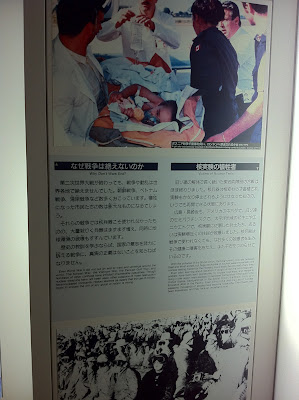My scheduled trip for June went off wonderfully well. In addition to being accompanied by my two oldest daughters, I made many valuable discoveries by walking the land and meeting the people of Iwakuni, Miyajima Island, and Hiroshima. Here is the Executive Summary of my trip report, and then some wavetop insights as they accompany a variety of pics:
If you would care to read the trip report I will produce concerning this trip, please feel free to contact me. Until next time...still working on which trip to do in July, will keep posting...
Executive
Summary. Hiroshima
city and the surrounding area, including Iwakuni city and the Marine Corps Air Station
there is culturally, politically, and strategically significant beyond the
obvious factor of Hiroshima’s notoriety.
Thousands of Japanese and international tourists visit Hiroshima each
year, drawn to the contemporary city but also to nearby Miyajima island which
contains the most famous Shinto torii gate and shrine structures in Japan. While enjoying the rich history of this
location, tourists are also educated at the Peace Memorial Park of the infamous
contemporary history of the dropping of the atomic bomb, where cultural
education quickly turns to political education.
This is because the city officials and politically active citizens of
Hiroshima have the taken the mantle of pursuing global nuclear disarmament upon
themselves and are waging a strong and peaceful campaign toward that
objective.
Contrasting
this pacifist identity Hiroshima attempts to adopt is the presence of a large
Maritime Self Defense Force base in Hiroshima, the fact that the city receives
one-quarter of its electricity from nuclear power plants, and the growing role
that Iwakuni MCAS is playing in the collective self-defense of Japan and
security of the region. Framing these pieces is the strong presence of
Buddhist and Shinto tradition found throughout the area and focused on Miyajima
Island. The chemistry of all these
factors creates a relatively quiet but important region which every Japanese
person I have spoken with during my ICT recognizes as a noteworthy area, even
if not everyone has actually been there.
The strength and pride of the Japanese people allow them to be aware and
approve of what Hiroshima tries to stand for, though in fact it is a little
disturbing to recognize that there is a good deal of one-sided propaganda being
disseminated. The danger in identifying
this propaganda is to be labeled insensitive to the horror of nuclear war, and
so while I individually may make observations and analyses, it appears that
both the U.S. and Japanese governments will continue to strengthen the security
posture in the area while leaving aside the nuclear debate. Therefore, a bit of a duplicitous flavor to
the area is perpetuated, which folds neatly into the Japanese bushido culture.
 |
| Cool tourist site, a soft ice cream store that boasts 100 flavors. I was not that adventurous and settled for cinnamon, which was very tasty. |
 |
| Hiroshima's A-Bomb Dome memorial, taken at dusk when the flood lights came on. The Peace Memorial Park is small enough to take in in one day, and well constructed to present a powerful message. |
If you would care to read the trip report I will produce concerning this trip, please feel free to contact me. Until next time...still working on which trip to do in July, will keep posting...








